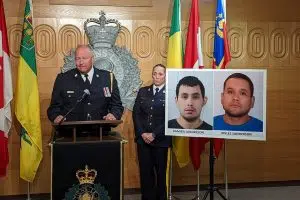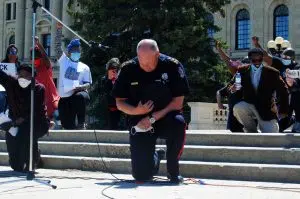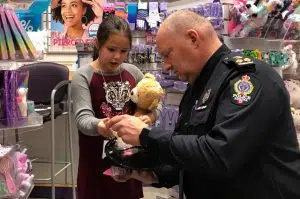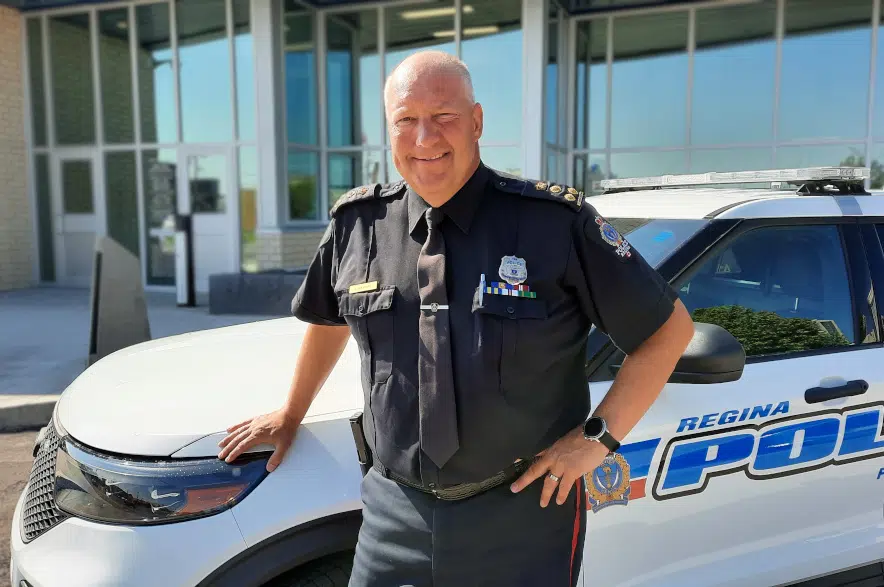Evan Bray was glad to be back behind the wheel of a Regina Police Service squad car — back where he started his career more than 27 years ago — as he finished out his last week with the service before retiring from the job of chief.
His last day on the job is Friday.
Driving up, down and around the streets of the city, Bray said there are many memories that come back as he looks around. He pointed out a convenience store he would often be called to and a pharmacy where he responded to a security guard who’d been stabbed.
“I don’t know if there’s a block in this city that we drive that I don’t look and think, ‘Oh, I remember taking this call there,’ or, ‘I remember a dispute on this corner,’ ” Bray said.
The bad memories do come up, but he made it a point to say there are good ones too. He recalled the Pride parade he took part in a few weeks ago.
“It was packed with people high-fiving and everybody’s having a good time,” said Bray with a smile.
Constable Bray
The chief started his policing career on New Year’s Eve in 1995. He said his very first call was to a church on College Avenue where a woman who was setting up a party in the basement reported her car stolen.
“I look at it now and I kind of chuckle because it was, you know, a pretty basic call … but at the time I was pretty nervous: ‘This is it. Here it is. This is the big leagues,’ ” Bray said.
“I’ve taken hundreds if not thousands of stolen auto reports since and I probably can’t remember 95 per cent of them but I’ll never forget this one.”

Regina Police chief, Evan Bray and Commanding Officer of the Saskatchewan RCMP, Rhonda Blackmore, speak about the investigation. (Logan Stein/980 CJME)
Only a few blocks away is the site of another first for Bray — the first murder case he worked. Darelle Exner was 14 years old when she was killed. Her body was found behind a gym.
“Seeing a young … girl deceased behind there,” Bray paused to find his words for a moment. “It was not a good scene.”
Bray was the first to arrive on the scene, just 10 months on the job at that point. The man who’d called in the body to police was present when police arrived and pointed her out to officers. Bray took him back to the station to get a statement; that same man was later charged with her death.
“It was a terrible, terrible, tragic event, but that call more than any call shaped lots of things for me about policing … Everything about that case was probably the biggest case in the early part of my career. It framed, sort of, where I went as a police officer,” said Bray.
Bray had a whole other career before coming to policing, though he said he’d wanted to be a police officer since he was five years old.
“That was my goal. All through school, elementary and high school, being a police officer was the No. 1 goal,” said Bray.
He grew up in rural Saskatchewan so he was looking to the RCMP but when he reached the right age, he said the Mounties weren’t jumping up to hire white men from Western Canada. That’s when Bray took a different route and went into radio and TV for a few years — until he had a Regina police officer in studio and they started talking.
Bray told him about his policing aspirations and the officer encouraged him to attend the citizen’s police academy. It whet Bray’s whistle — he applied and was soon accepted.
In between being hired and going into training, Bray said he remembers running into an officer he knew who gave him some advice.
“ ‘Everything you learn in police college, yeah, it’s important but 98 per cent of policing is common sense and knowing how to talk to people,’ ” relayed Bray.
At the time, Bray said he was skeptical, but now nearly three decades into the work he knows that officer was right.
“It’s literally talking to people, building relationships,” said Bray.
Challenges
Bray was named chief of the Regina Police Service in 2016. He said others have told him he talked about wanting the top job early on, but couldn’t remember that himself.
A lot has happened in Regina since Bray’s appointment, from a months-long work dispute at the Co-op refinery to policing in a global pandemic to a deadly police shooting to a provincial manhunt. But when asked about his greatest challenges, Bray drove to the Saskatchewan Legislature and talked about incidents where things got very political and polarized quickly. It led to Bray and the police service receiving criticism from both sides.
He talked about the Justice for Our Stolen Children camp and protest on the Legislature’s west lawn in 2018. The protest revolved around social services and systemic racism in both that system and in corrections.
Bray said that is a complicated issue and even though the camp is gone, the problems it was trying to address aren’t.

Regina police chief Evan Bray kneels for 30 seconds with the other officers who attended a Black Lives Matter rally to show their commitment to ending racism. Jun. 5, 2020 (Lisa Schick/980 CJME)
The chief also pointed to the steps in front of the Legislature and talked about the large Black Lives Matter march and protest he attended after George Floyd was killed by police in Minneapolis in 2020.
“I stood there at a microphone — in fact I took a knee right there — in front of the crowd of people to show that our police service stands in solidarity in the fight to end racism, to build a safer community,” said Bray.
He said that’s another situation where, even though the protest is no longer happening, the issue remains and needs to be addressed.
Bray remembers sitting at home when Floyd was murdered and watching the video of his death.
“My wife said, ‘I can’t watch this.’ And I said, ‘I have to watch this.’ I wanted to see what happened, I wanted to understand what happened and I felt the pain the same as everybody else did for a fella that needed to be treated differently than he was, for the police to be handling it different than they did,” said Bray.
“I felt that pain as a human being, but also as a police officer, I felt shame and embarrassment.”
Bray said seeing bad actions from police anywhere is the most frustrating and saddening thing in the world.
“Those reflect on us as a profession and us as a police service and it tends to not matter what the shoulder flash on your shoulder says. Someone in Toronto does something that society hates, then it’s going to impact us here too,” the chief explained.
Triumphs
When asked about his biggest triumph in his time as chief, Bray parked in front of the brand new police headquarters, the public areas of which just opened this week.
Bray said that when he was hired as chief, he was tasked with two specific things: Building strong relationships with the community and improving moral and building strong relationships within the police service. Bray believes the new police headquarters represents both those things.
“Having a new police headquarter building doesn’t mean that now morale’s good, but one of the reasons why we were experiencing challenges is we grew,” said Bray.
The chief explained that as Regina has grown, the physical size of the police service wasn’t keeping up.
“We were squished in. We had substandard rooms where we were doing our ident investigations and our evidence management. So being able to work and putting together a new footprint for our headquarter building means that we can operate as a professional police service,” said Bray.
The new headquarters is a bigger building, but also represents the growth of the service itself to Bray. He explained that before, demands on the service were high so the workload for officers was high. They weren’t getting breaks, they were swamped with files and response times were lagging, so growth had to happen.
“I think of this as kind of a big part of just overall community safety and wellness and really positioning us to continue to do these important and positive things for the city,” he said.
To Bray, growth also involves the new and modern equipment the service has brought in like a tactical rescue vehicle and a police plane – the latter of which he says is getting incredible results.
Retirement
At 53 years old, Bray doesn’t think he’s going to be spending his retirement in a rocking chair. He said he still has something to contribute – though he doesn’t know what that is yet.
“I want to make sure whatever I do next is something that is a passion, something that I’m going to enjoy and something that still allows me to give back,” said Bray
In the short term, he plans to spend time with family, at the lake and helping out with harvest.
“That will be my plan to do those types of things and then to keep an eye open for what’s next,” he said.

Regina Police Chief Evan Bray with nine-year-old Madi, taking part in the fifth annual CopShop on Dec. 16, 2019. (Lisa Schick/980 CJME)
For the first three or so years of his time in the top job, Bray said he would work evenings, weekends and holidays, but during COVID, Bray’s life, like many others, was simplified – no gatherings, sometimes working from home – and it gave him a glimpse of what could be.
“It showed what normal life might be like, having a weekend with absolutely nothing on, or if you did have something on it was sitting at the table at the computer doing it virtually and so it didn’t require you to travel and be gone for a long time,” said Bray.
He and his family may be looking forward to it, but Bray said he is going to miss the work.
“You can’t give a big chunk of your life to an organization and walk away feeling nothing,” said Bray.
But Bray won’t be leaving Regina – he compared his feelings about the city to falling in love with someone, that usually you don’t just see the good side, you see everything – and he believes that relationship exists for a community as well.
“I know everything about this city. I know the good things and I know the bad things – and there’s lots of bad things and challenges – but it doesn’t mean I don’t love the community. In fact, I love it as much, if not more, than I did when I first moved here 35 years ago,” said Bray.











